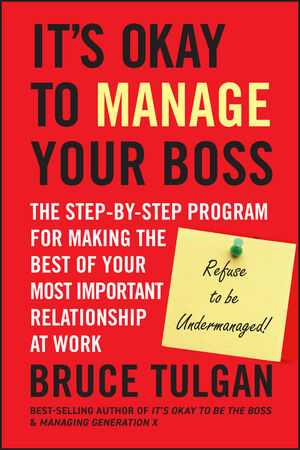It's Okay to Manage Your Boss: The Step-by-Step Program for Making the Best of Your Most Important Relationship at WorkISBN: 978-0-470-60530-1
Hardcover
208 pages
September 2010, Jossey-Bass
 |
||||||
Connect with Wiley Publicity
Most people agree: this is not the recession of their parents’ generation. Jobs are scarce and the competition for them—even for less than desirable positions—is more intense than ever before. Companies are cutting back on overhead expenses and staff, as they ride out the financial crisis, and many of today’s employees are overworked, often performing the job of two or three people for no additional pay. Research shows that many employees feel powerless and won’t complain about their circumstances, holding onto their job is akin to clinging to a life boat, added to this, is the epidemic of undermanagement, which makes for a precarious work environment.
We’ve all heard about micromanaging but according to Bruce Tulgan, corporate adviser, founder of RainmakerThinking, a research and training firm, and author of the bestseller, It’s Okay To Be The Boss, undermanaging is an equally ruinous work dynamic that contributes to resources being squandered, small conflicts escalating, and the defections of high performing employees. It’s easy—and common— to blame supervisors for falling short, but they too, are in a difficult position, says Tulgan, because they are talented individuals, often promoted for exhibiting strengths but haven’t a clue how to manage. “Too many in leadership positions—at all levels—are disengaged from the people that report directly to them on a day-to-day basis,” he says. What’s more, “undermanaging or failing to talk with a team member at least once a week is a disease of epic proportions that must be addressed for a successful and functional workplace.”
In an important new book, IT’S OKAY TO MANAGE YOUR BOSS (Jossey-Bass; September 2010; $23.95), Tulgan reassures suffering employees, that it is indeed acceptable—and advisable—to manage their boss. By empowering high performers with the tools to improve relationships with their managers, Tulgan provides an invaluable resource for “managing up.” He reveals what employees need from their bosses to promote success at work, like, setting clear expectations, giving honest feedback, and recognition.
“Although managers are demanding more and more from their employees, they are also providing them with less guidance than ever before,” says Tulgan. But “employees need to take greater responsibility for getting what they need.” In IT’S OKAY TO MANAGE YOUR BOSS, Tulgan explores:
- extracting a list of clear goals and a concrete timetable to accomplish them;
- determining the skills and tools needed to meet a manager’s expectations;
- taking it one boss at a time, one day at a time;
- earning credit and rewards in exchange for good performance;
- dealing with common “jerk boss” scenarios;
- tracking your own performance every step of the way;
and much more.
In this essential guide, chock-full of tips for working more effectively with managers and helping employees stay in a workplace that is becoming increasingly more diverse, fast-paced and globally connected than ever before, Tulgan illustrates that workers can—and must—take control of their professional futures.
In IT'S OKAY TO MANAGE YOUR BOSS, Tulgan debunks the ten myths about how one should be managed and how to manage up. He then helps readers take responsibility for getting the following four essential things from their bosses in order to succeed at their jobs:
- Clearly spelled out and reasonable expectations (that is, clear goals with specific guidelines and a concrete timetable to accomplish them).
- The skills, tools, and resources necessary to accomplish those expectations, or else the acknowledgement that you are being asked to achieve those expectations without the skills, tools, or resources that you need.
- Accurate and honest feedback about your performance as well as course-correcting direction when necessary.
- A fair quid pro quo—recognition and rewards—in exchange for your performance.
Bruce Tulgan is an adviser to business leaders all over the world and a sought-after speaker and seminar leader. He is the founder of the management training firm RainmakerThinking, Inc., where he works with top companies on improving their management practices. Bruce is the author of the bestselling It's Okay to be the Boss, the classic Managing Generation X, as well as Not Everybody Gets a Trophy, Winning the Talent Wars and eleven Manager's Pocket Guides.
In this essential book, Tulgan reassures employees that it’s ok to manage their bosses. They just have to be really good at it. This book will help them do just that.



